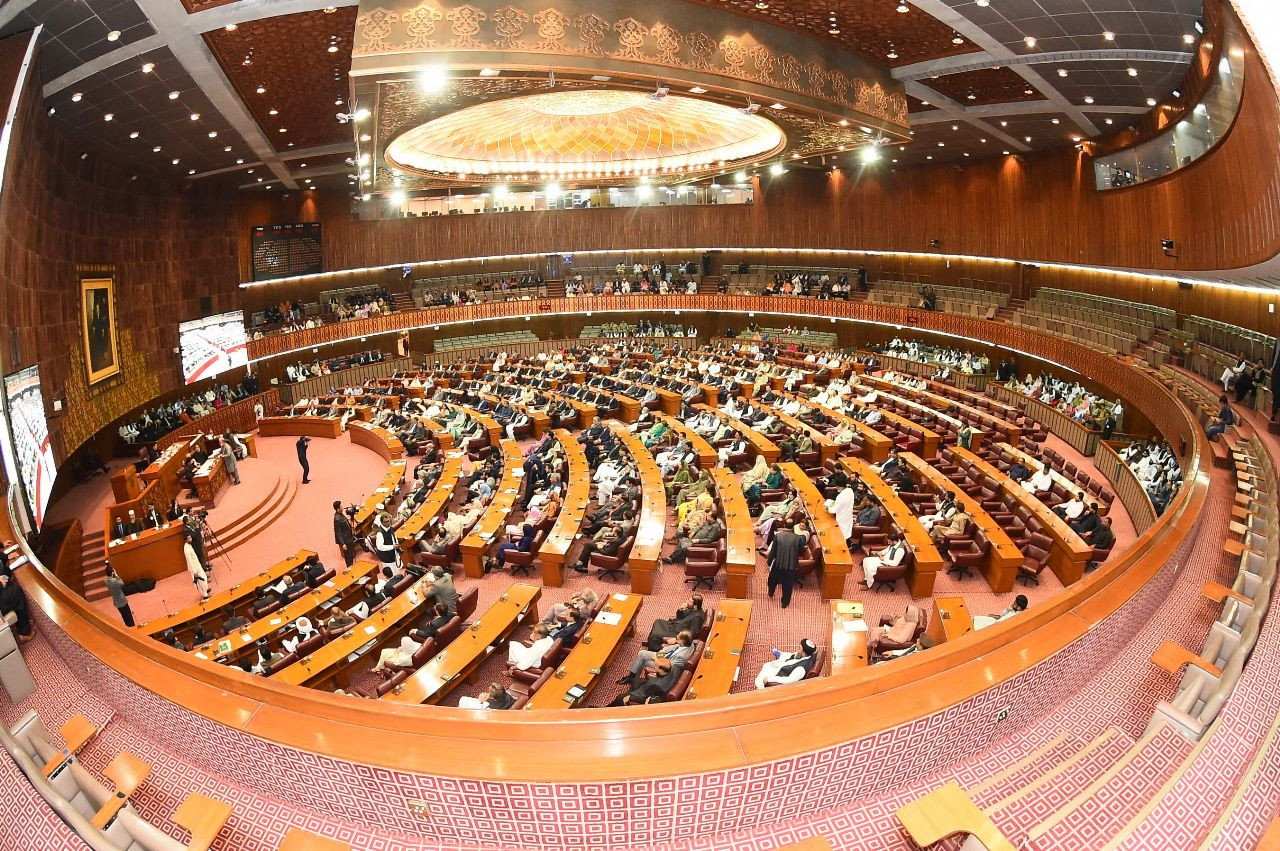
The government on Monday introduced a ‘money bill’ in parliament to settle the dispute over making Rs21 billion payments to the Election Commission of Pakistan for holding polls in two provinces - a move that may further deepen frictions between the executive and the judiciary.
Through the introduction of a new bill the government has shifted the onus of approving Rs21 billion funds on parliament besides gaining more time for releasing money that the Supreme Court of Pakistan had directed to disburse to the ECP by April 10.
However, till the deadline, the ECP did not receive the money from the government.
Finance Minister Ishaq Dar introduced the “Charged Sums for General Elections (Provincial Assemblies of the Punjab and the Khyber Pakhtunkhwa)” Bill 2023 in both the houses of parliament.
The bill is aimed at carving a legal way for the release of Rs21 billion funds for holding elections in Punjab and Khyber-Pakhtunkhwa.
Dar introduced the piece of legislation as ‘money bill’, which gives the voting right on it to the National Assembly and a maximum 14-day time to the Senate to give the recommendations on the bill.
In case of the bill, the Senate’s recommendations are non-binding on the National Assembly.
The finance minister introduced the bill the day the federal government was bound under a court judgment to provide funds to the ECP.
However, the government has not accepted the Supreme Court judgment, describing it as invalid due to dispute over the number of apex court judges backing it.
Last week, the Supreme Court ordered the ECP to hold elections in two provinces on May 14, directing the federal government to release Rs21 billion to the ECP by April 10 (Monday). But the federal cabinet on Sunday decided to refer the matter to parliament.
Clause 3 of the bill stated, “The sums payable to the Election Commission for general election to the province of the Punjab and the province of the Khyber-Pakhtunkhwa shall be an expenditure charged upon the Federal Consolidated Fund (FCF).”
The FCF has been defined as having “all revenues received by the federal government, all loans raised by that government and all moneys received by it in repayment of any loan, shall form part of a consolidated fund”.
The same definition has been given in the Constitution.
The bill stated that the law is being made under Article 81 (e) of the Constitution. Article 81 (e) says, “Any other sums declared by the Constitution or by Act of Parliament to be charged” upon the federal consolidated fund.
Through the bill, the government has adopted the path given in Article 79 of the Constitution, which gives custody of the FCF to parliament.
Had the government not moved the bill, it would have to give the funds to the ECP under Article 84 of the Constitution that deals with the supplementary and excess grants in a fiscal year.
By moving the bill, the government has gained time, as the matter has now been referred to the Senate that will also take a few days to give its recommendations.
The finance minister also laid the bill before the upper house of parliament.
Senate Chairman Sadiq Sanjrani said that the notices for the proposal to make recommendations on the money bill should be submitted by the members to the Senate Secretariat by Thursday, April 13.
The proposal received for making recommendations on the money bill will be sent to the Senate Standing Committee on Finance and Revenue which will submit its report by Friday, April 14, he added. The Senate would consider the committee’s report and make recommendations to the National Assembly.
In case of the charged expenditure, the National Assembly did not have the right to vote it out, as these expenses are considered constitutionally obligated. But still, parliament's endorsement is needed.
Currently, the expenses by the president, the Supreme Court of Pakistan, election commissioner, parliament, the office of the Election Commission and the auditor general for Pakistan are among the charged expenses.
The bill stated that it shall “override other laws” and have effect “notwithstanding anything contained in any other law, rules and regulations” when it will be in force.
It added that the proposed law would stand repealed once elections for both the assemblies were held, noting that the general elections and polls to the Sindh and Balochistan assemblies need not be held for it to be repealed.
Dar on Monday criticised the former PTI government, blaming it for the current economic crisis.
Dar once again threw the responsibility of the delay in the IMF deal on the PTI, claiming that his government was making all-out efforts to complete the IMF programme and the staff-level agreement would be signed soon.
Lack of $6 billion financing and the petrol subsidy remain two biggest hurdles in the way of the staff-level agreement.
Dar said that the PTI dissolved the Punjab and K-P assemblies under a planned conspiracy to create a constitutional crisis in the country. He maintained that holding elections in the country was a constitutional responsibility but contended that it was important to hold polls across the country simultaneously under caretaker governments.
“This will help in saving money and holding elections freely, fairly and in a transparent manner,” the minister stressed. “Under the Constitution of Pakistan, the sovereignty of parliament is a reality,” the finance minister said.
The ECP estimated the total cost of holding elections in these two provinces at Rs20.5 billion, excluding Rs5 billion that will be needed for by-elections on the National Assembly seats. In case the elections are held on the same day, the government anticipates Rs9.3 billion savings.
He stated that the ECP was responsible for holding free and fair elections but contended that holding polls right now was not in Pakistan’s national interest, given the current economic and security situation.
Dar said that the top court’s verdict was a “minority” judgment and parliament, therefore, had urged the government not to implement it.
The federal cabinet, in its recent meetings, decided that the SC’s order for the release of election funds will be presented in parliament for discussion, he concluded.



1727778647-0/diddy-(16)1727778647-0-165x106.webp)

1732014631-0/BeFunky-collage-(71)1732014631-0-165x106.webp)
1732012115-0/Untitled-design-(14)1732012115-0-270x192.webp)




1732011525-0/Express-Tribune-(8)1732011525-0-270x192.webp)






COMMENTS
Comments are moderated and generally will be posted if they are on-topic and not abusive.
For more information, please see our Comments FAQ